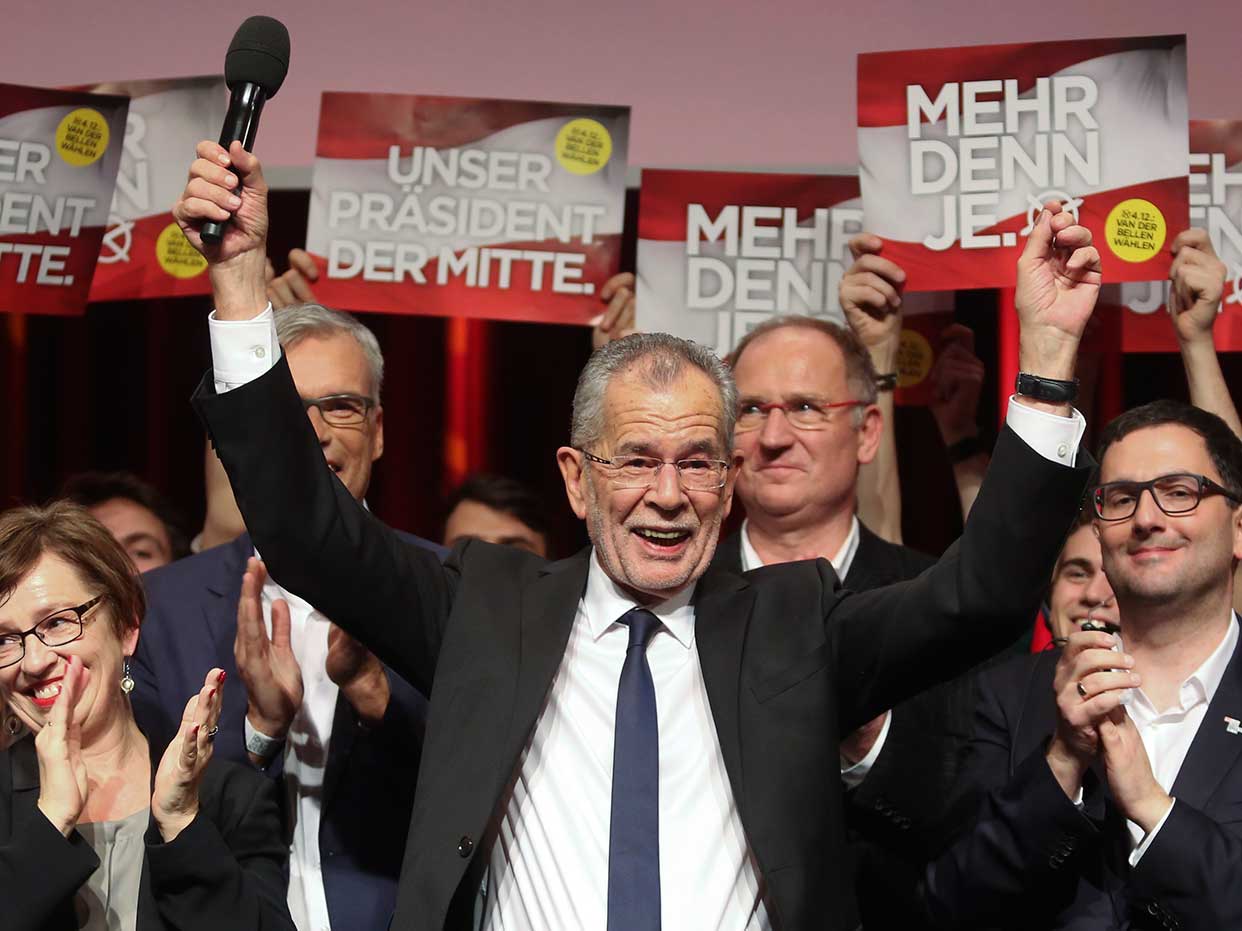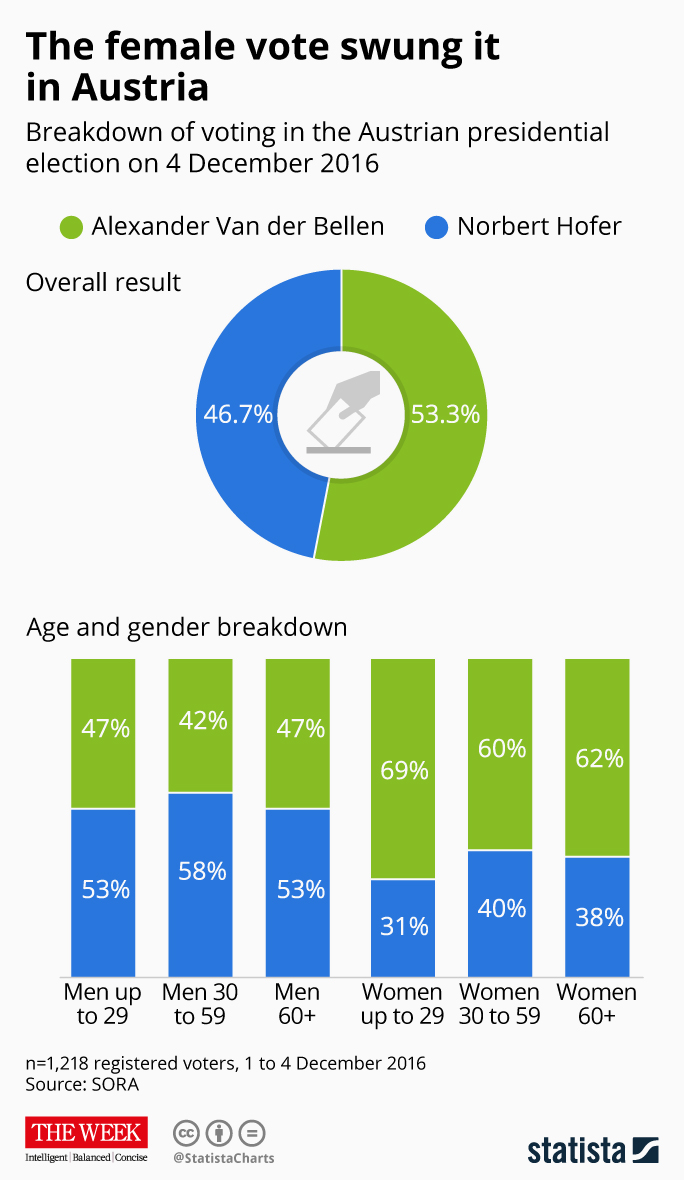Austrian election: Far-right leader concedes defeat
Pro-European candidate Alexander Van der Bellen becomes president as Norbert Hofer only wins 46.7 per cent of vote

A free daily email with the biggest news stories of the day – and the best features from TheWeek.com
You are now subscribed
Your newsletter sign-up was successful
Austrian voters have rejected far-right candidate Norbert Hofer to be their next president, instead choosing Alexander Van der Bellen, the pro-European independent candidate backed by the Greens.
Hofer, who was seeking to become the first far-right leader in Europe since World War II, polled 46.7 per cent to his rival's 53.3 per cent.
Voters "resoundingly rejected anti-immigration and Eurosceptic" Hofer, in what has been an "ugly and polarising election in normally peaceable Austria", says the Daily Telegraph.
The Week
Escape your echo chamber. Get the facts behind the news, plus analysis from multiple perspectives.

Sign up for The Week's Free Newsletters
From our morning news briefing to a weekly Good News Newsletter, get the best of The Week delivered directly to your inbox.
From our morning news briefing to a weekly Good News Newsletter, get the best of The Week delivered directly to your inbox.
Conceding defeat less than half an hour after the first exit poll results were published, the politician described himself as "endlessly sad".
"I congratulate Alexander Van der Bellen for his success and ask all Austrians to pull together and work together," he said.
Van der Bellen said: "I will try to be an open-minded, a liberal-minded and first of all a pro-European federal president of the Republic of Austria."
His win was particularly resounding in urban areas, with all 23 of Vienna's districts rejecting Hofer's populist platform. He also had greater support from female voters than male.
A free daily email with the biggest news stories of the day – and the best features from TheWeek.com

Despite the office of president being "largely ceremonial", the poll "had been seen as a sign of how well populist candidates might do elsewhere in Europe", the BBC says.
The ballot was a rerun of the May 2015 vote, which Van der Bellen won with just 50.35 per cent. That election was "marred by postal vote irregularities", says the BBC, forcing it to be staged again.
Infographic by www.statista.com for TheWeek.co.uk.
-
 What to know before filing your own taxes for the first time
What to know before filing your own taxes for the first timethe explainer Tackle this financial milestone with confidence
-
 The biggest box office flops of the 21st century
The biggest box office flops of the 21st centuryin depth Unnecessary remakes and turgid, expensive CGI-fests highlight this list of these most notorious box-office losers
-
 What are the best investments for beginners?
What are the best investments for beginners?The Explainer Stocks and ETFs and bonds, oh my
-
 Epstein files topple law CEO, roil UK government
Epstein files topple law CEO, roil UK governmentSpeed Read Peter Mandelson, Britain’s former ambassador to the US, is caught up in the scandal
-
 Iran and US prepare to meet after skirmishes
Iran and US prepare to meet after skirmishesSpeed Read The incident comes amid heightened tensions in the Middle East
-
 Israel retrieves final hostage’s body from Gaza
Israel retrieves final hostage’s body from GazaSpeed Read The 24-year-old police officer was killed during the initial Hamas attack
-
 China’s Xi targets top general in growing purge
China’s Xi targets top general in growing purgeSpeed Read Zhang Youxia is being investigated over ‘grave violations’ of the law
-
 Panama and Canada are negotiating over a crucial copper mine
Panama and Canada are negotiating over a crucial copper mineIn the Spotlight Panama is set to make a final decision on the mine this summer
-
 Why Greenland’s natural resources are nearly impossible to mine
Why Greenland’s natural resources are nearly impossible to mineThe Explainer The country’s natural landscape makes the task extremely difficult
-
 Iran cuts internet as protests escalate
Iran cuts internet as protests escalateSpeed Reada Government buildings across the country have been set on fire
-
 US nabs ‘shadow’ tanker claimed by Russia
US nabs ‘shadow’ tanker claimed by RussiaSpeed Read The ship was one of two vessels seized by the US military